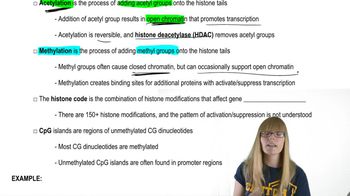Here are the essential concepts you must grasp in order to answer the question correctly.
Epigenetics
Epigenetics refers to the study of heritable changes in gene expression that do not involve alterations to the underlying DNA sequence. These changes can be influenced by various factors, including environmental stimuli, and can affect how genes are turned on or off. Common epigenetic mechanisms include DNA methylation and histone modification, which play crucial roles in regulating gene activity.
Recommended video:
DNA Methylation
DNA methylation is a key epigenetic modification where methyl groups are added to the DNA molecule, typically at cytosine bases. This process can silence gene expression by preventing transcription factors from accessing the DNA. Abnormal patterns of DNA methylation are often observed in cancer cells, leading to the silencing of tumor suppressor genes and contributing to tumorigenesis.
Recommended video:
Histone Modification
Histone modification involves the addition or removal of chemical groups to histone proteins around which DNA is wrapped. These modifications, such as acetylation and phosphorylation, can alter the structure of chromatin, making it more or less accessible for transcription. In cancer, specific histone modifications can lead to the activation of oncogenes or the repression of genes that normally inhibit cell growth, thus promoting cancer development.
Recommended video:
Histone Protein Modifications
 Verified step by step guidance
Verified step by step guidance Verified video answer for a similar problem:
Verified video answer for a similar problem:

